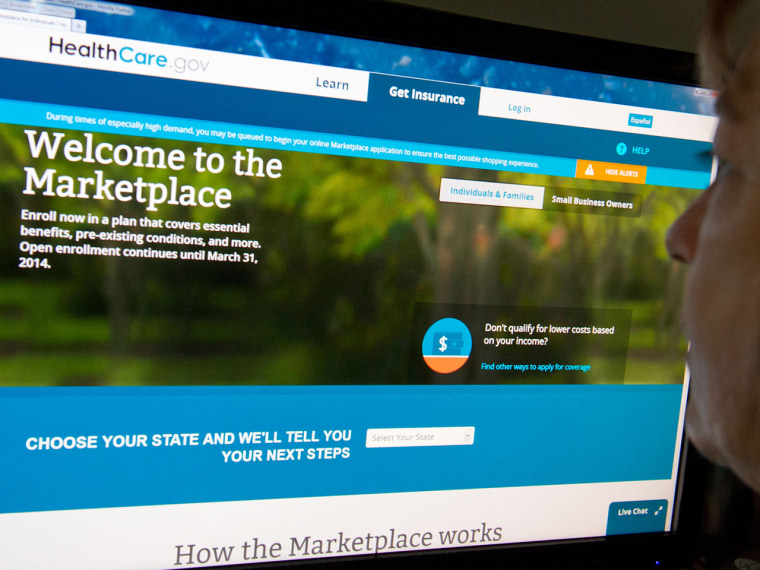People are flocking to the more successful state health insurance exchanges in the final days before a late-December deadline, exchange directors said Wednesday.
So many people are calling in for help that states have had to beef up call center staffing, and insurers have agreed to let deadlines slide a bit so that as many people as possible can get coverage starting Jan 1.
In just five states – California, Connecticut, Kentucky, New York and Washington – more than 436,000 people are signed up for health insurance – more than in the 36 states covered by the federal exchange. But the directors of the five exchanges say what’s happening in their states reflects much of what is going on nationwide – people want health insurance being offered by the Affordable Care Act.
“We are seeing huge interest,” said Peter Lee, executive director of Covered California. “In the first week of December we had 50,000 pick a plan in Covered California. That’s an average of 7,000 a day.” Last week, Lee says, 15,000 people a day were signing up for insurance in California. New York is enrolling 4,500 people a day, Lisa Sbrana, counsel to the New York exchange, said.
This tends to support what federal health officials had predicted – that people would wait until the last minute to sign up for health insurance. On the federal exchange, they’ve been forced to – the HealthCare.gov website was not working well at all until the beginning of December. But even on the state sites that got off to a good start, people have waited until this month to really pile on.

As a result, insurance companies have agreed to let go of their usual strict deadlines for getting health coverage. Usually, people have to sign up by the 15th of the month for coverage that will start at the beginning of the next month. That means if you sign up and may on, say, Feb. 16th, your policy will not start covering you until April 1.
But on Wednesday, members of America’s Health Insurance Plans said they would give people until Jan. 10 to pay premiums for coverage that would start retroactively on Jan. 1, so long as they get the rest of the signing-up process done by Dec. 23.
“Health plans are voluntarily making this one-time change to the payment deadline to help protect consumers from potential gaps in their coverage caused by the ongoing technical problems with HealthCare.gov,” the group said in a statement.
“Significant progress has been made in recent weeks to improve the enrollment process for consumers, but more work needs to be done to resolve the back-end challenges, particularly those related to processing enrollment files, to ensure all consumers who selected a plan are enrolled in coverage.”
This doesn’t mean everyone in the country has until Jan. 10 to pay. “Healthcare’s local,” Lee said. “People in California need to have paid by Jan. 6th.” Washington state is giving people until Jan. 15 to pay their first premium.
If people pay their first premium after coverage starts, they’ll have to pay out of pocket for any doctor or hospital visits they make or prescriptions they fill, and then get reimbursed later by the insurance company. Many people will have deductibles anyway, and may end up paying for those first visits themselves.
“This is not business as usual for health plans or for exchanges,” Lee noted.
Directors of all five exchanges said this first year of Obamacare has been a crunch for everyone. They say they hope mistakes made this year will help make everything go more smoothly in the future.
“What isn’t going so well for us is the call center,” Kevin Counihan, CEO of Access Health Connecticut, told reporters on a call organized by Families USA, a pro-health-reform group. “We didn’t staff up fast enough.” He said calls were coming in at three times the rate they were just two weeks ago as people try to figure out the intricacies of getting health insurance coverage, the tax implications and what they have to do to get a federal subsidy to pay premiums.
In Kentucky, where 92,000 people have enrolled in either private health insurance or Medicaid on the exchanges, call center staffing had to be increased from 100 to 150, said Carrie Banahan, director of Kentucky's exchange.
Site directors say they had to tweak their sites as they watched how people behaved in real life, said Richard Onizuka, who's in charge of the Washington state site. And they've had to do some on-the-job training for the in-person assistants helping people sign up. "We started six months later than we should have," Onizuka said.
New York's Sbrana said website operators had to change a procedure when they realized people were missing a vital step to ask for financial assistance. "We made it a mandatory yes or no question," she said.
So far, plenty of young adults are signing up on for health insurance, the exchange directors said. That's important — insurance companies need a balance of healthy people to outweigh more costly sick people and older folks who require more care. Banahan says 41 percent of those enrolling in Kentucky are under 35. In Washington state, 18 percent of enrollees are aged 18 to 34.
The exchange directors also defended the federal website, which is processing the final few steps of enrollment for even the state sites via what's called the "Hub". Insurance companies have complained that the very last step of the process, called the back end, for the federal site has been glitchy. "We have a good-looking back end, so to speak," Lee said.
People have until March 31 to sign up for insurance on the exchanges and be covered, legally, for 2014. The Affordable Care Act requires almost everyone to have health insurance of some sort or pay a tax.